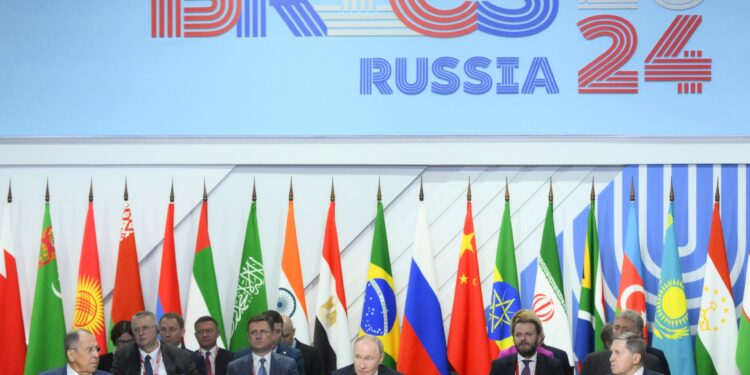Russian President Vladimir Putin’s attempt to pass a proposal to create an alternative international payments system to SWIFT to limit the dominance of the dollar does not seem to have received much resonance with the countries participating in the BRICS summit held recently in Kazan, Russia. China, India, and Iran have shown limited interest in the initiative, hindering its progress.
Writers Charles Clover and Daria Mosolova said in the report published by the Financial Times that Putin promoted a new framework for international payments to world leaders gathered during the BRICS summit, and was keen to show his disregard for Western sanctions and his challenge to the global financial system dominated by the United States.
Putin accused Western powers of “using the dollar as a weapon,” explaining that the sanctions imposed on Russia since its invasion of Ukraine “undermine confidence in this currency and reduce its strength.”
The main item on the agenda of the summit – which was attended by the leaders of China, India, Iran and other countries – was the Russian initiative to circumvent the US dollar by creating a new payments system known as the “BRICS Bridge.”
Efforts to break the dominance of the dollar
The writers said that the financial sanctions imposed on Russia following its invasion of Ukraine in 2022 played a major role in limiting its foreign trade and international financial dealings, which made it promote this initiative as an alternative to the “SWIFT” system, which is the messaging system used to deal with trillions of dollars in bank payments. Around the world.
The writers added that Russia is not the only one looking to break the hegemony of the dollar. Rather, other BRICS countries, especially China and Iran, feel angry at Western financial hegemony, and have often tried to find alternatives to break it.
Chen Qi, a professor and expert in global governance at the Institute of International Relations at Tsinghua University in Beijing, believes that non-Western countries such as China, Russia, India, and even Saudi Arabia have the same concerns that the United States may one day exclude them from the SWIFT system.
He added that if this alternative system is proposed in the future, it will be welcomed by these countries despite the difficulty of agreeing on the details related to it.
The BRICS summit in South Africa last year witnessed the presentation of a proposal for a unified currency for the BRICS group, and a prototype of banknotes for the new currency was revealed for the first time on Russian television last Wednesday, although it is not yet clear how it will be used.
Limited interaction
According to Alexandra Prokopenko, a fellow at the Carnegie Russia and Eurasia Center in Berlin, the Kremlin is trying to create an alternative global financial infrastructure on the condition that Russia is at the heart of this system.
The authors considered that the proposal for the new payment system did not find the required interaction, and was not translated into practical steps for its implementation. Earlier this month, the finance ministers of China, India and South Africa were absent from the BRICS finance ministers’ meeting, indicating their lack of interest in the proposals made in this regard.
Prokopenko noted that the delegations participating in the summit this year were large, but they aimed to conclude bilateral deals and did not focus on the common BRICS agenda.
According to the authors, the main problem with this initiative is that the United States has made clear to other countries that doing business with Russia may cost them financial sanctions, and this hampers the Kremlin’s efforts to build an anti-sanctions payments network.
The impact of this has been clearly evident since December last year, when the United States issued an executive order threatening to impose secondary sanctions on entities involved in financing and supplying the Russian war effort.
This threat has prompted banks in countries such as Turkey and China to sharply reduce dealings with Russian companies, and this led the Russian Ministry of Economy to recently reduce its forecast for imports in 2024 by 9%.
The authors added that US sanctions also led to the exclusion of Russian bank cards from payment systems in many countries, and the official website of this year’s BRICS summit asked participating delegations to bring cash because credit cards do not work in Russia.
Long term concerns
Although many experts believe that the Russian initiative is not applicable, central bank officials confirmed during the meetings of the International Monetary Fund and the World Bank in Washington this week that they take the Russian proposal seriously. They expressed their concern about the long-term risk that it might lead to the fragmentation of the global payments system due to geopolitical tensions.
According to Agathe Demarais, a fellow at the European Council on Foreign Relations think tank, Russia uses non-Western currencies for nearly 80% of its cross-border trade, 20% more than before its war on Ukraine in early 2022.
Demarais pointed out that mechanisms such as the “BRICS Bridge” will certainly be useful for China, Russia and other countries in the long term to circumvent Western hegemony, despite the difficulty of adopting BRICS financial initiatives on a large scale among the countries of the world at the current stage.



